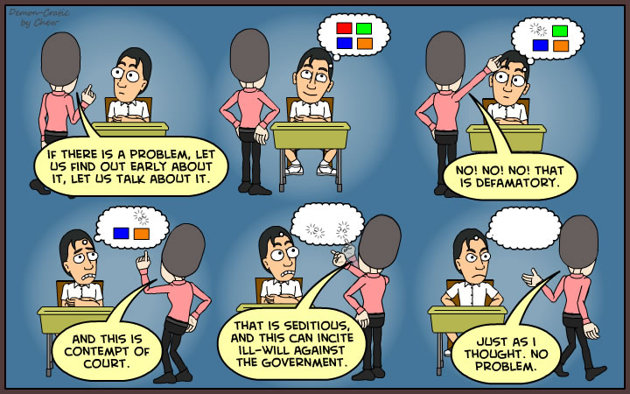The AG’s Perverse Use of the Sub Judice Rule in the Amos Yee Case
 A few days ago I wrote about how I had received the news that Amnesty International had decided to make Amos a “Prisoner of Conscience” (Breaking news: Amos Yee :World’s Youngest Prisoner of Conscience to be recognised by Amnesty International).
A few days ago I wrote about how I had received the news that Amnesty International had decided to make Amos a “Prisoner of Conscience” (Breaking news: Amos Yee :World’s Youngest Prisoner of Conscience to be recognised by Amnesty International).
I also wrote about how just before receiving that news I was very upset to read Amos’s lawyer, Alfred Dodwell’s letter to Justice Jasvender Kaur which detailed Amos’s descent into depression and suicidal thoughts as a result of the harshness of his treatment. He also said that Amos’s mother was very upset at the disproportionate punishment her son had received.
Dodwell also criticised the way that Justice Kaur had allowed the prosecution to introduce new evidence at the sentencing hearing which essentially constituted fresh charges for which Amos should have been tried and given the opportunity to defend himself. He pointed out quite rightly that this was unfair.
I reproduced Dodwell’s letter in full as part of my blog post. So did The Online Citizen (TOC). On 15 June TOC published an article saying that they had received a Take-Down Notice from the Attorney General’s chambers requiring them to take down Dodwell’s letter and that they had complied. Dodwell also received a Take-Down Notice which his firm complied with. However despite also reproducing Dodwell’s letter I did not receive a Take-Down Notice.
This is what TOC said:
“The Attorney-General’s Chambers take the view that defence counsel’s publication of the letter on the website of M/S Dodwell & Co. amounts to sub judice conduct; further, that the letter does not convey an accurate picture of the proceedings in this case,” said Deputy Public Prosecutor Kelvin Koh.
“Please note that any subsequent publication of the said letter would also be conduct offending the sub judice rule.”
When I comment on legal matters I always point out that I am just a layman and not legally qualified. However my understanding of the meaning of sub judice is that it refers to the publication of material in the period between a person being charged with a crime and his subsequent conviction that could sway the jury and lead to an unfair trial. This might include information about the past history of the accused or the victim or comments by judges or elected officials which prejudge the accused’s guilt.
I consulted the AG’s site and could only find this document entitled “Understanding Legal Processes: Contempt of Court“: I reproduce the relevant section below:
- Contempt of court takes many forms and is essentially conduct that may impede the functionality of the court. Contemptuous acts are classified into two broad categories, namely, contempt by interference and contempt by disobedience.
(a) Contempt by interference
This category comprises a wide range of acts, including the disruption of the court process itself, acts which risk prejudicing or interfering with particular legal proceedings (also known as sub judice contempt), and acts or writing published calculated to bring a court or a judge of the court into contempt, or to lower his authority (also known as scandalising contempt).
(b) Contempt by disobedience
This category includes disobedience of court orders as well as breach of undertakings given to the court.
Does Dodwell making public his letter to Justice Kaur risk prejudicing or interfering with legal proceedings?
I would argue not , since Amos has already been convicted. In any case contempt of court rules in the UK, which our legal system follows closely, have been aimed at preventing juries from being influenced adversely by publication of a defendant’s or a victim’s previous history or from tampering with the jury or attempting to intimidate or bribe jurors or witnesses. A summary of the UK Crown Prosecution Service (CPS) rules dealing with contempt of court can be found here. However restrictions on reporting cases
The CPS rules state:
Any restriction on reporting is contrary to the general rule in favour of open justice, and the fair and accurate reporting of public court proceedings.
Article 10 of the European Convention on Human Rights (the right to freedom of expression (the freedom both to impart and to receive information, regardless of frontiers), is a qualified right, and interference of it in the form of restrictions may be appropriate where this is necessary and proportionate in pursuit of a legitimate aim such as the protection of the rights of others to a fair trial (Article 6 ECHR), or to privacy (Article 8 ECHR).
However interference is only appropriate to the extent to which it is truly necessary, and there should be no interference (or a lesser degree of interference) where the result might be achieved by other means.
It is difficult to see how the AG can justify his restrictions on reporting of Dodwell’s letter. It does not prejudice Amos’s right to a fair trial (in any case he has already been convicted). Nor does it protect anyone’s right to privacy. There are no juries in Singapore since Lee Kuan Yew abolished trial by jury back in the 1960s on the grounds that juries were acquitting too many criminals. Since then all trials have been decided by judges. Judges are legally trained and supposed to be impartial and incapable of being swayed by public pressure which is why they are not sequestered like juries. Even though I may criticise some of her decisions, I am confident that Justice Kaur’s professionalism will not allow her decisions to be swayed by pressure or intimidation from whatever source.
The only people protected by this absurd take-down notice are those (the PAP Government, the Lee family, the AG and Justice Kaur) who are unjustly and unfairly using the obscenity law and the charge of wounding religious feelings to cruelly and inhumanely punish a child for exercising his rights to freedom of expression and do not want this to be exposed for what it is. This is a perversion of the purpose of contempt of court rules.Just as in any other advanced country Singaporeans should have the right to criticise a judge’s decision when obviously inconsistent or unjust. We have the right to know what is being done to a 16 year old boy when it seems to serve no other obvious purpose than to scare others




Kenneth, come to think of it, while on the present contention we should rightly argue that a trained judge should be rightly trusted not to be unduly influenced by public pressure, we might also not let this truth undermine your late father’s opposition to LKY’s abolishing of the jury. This reliability of a judge trained in law should be balanced by how that very training might in other crucial situations enable a trained legal mind to imagine, for instance, that perversity of judging that “being in the premise of a polling station is not prohibited by a law that says one cannot come within the vicinity of a polling station”. At such situations, a jury of untrained persons with only commonsense is surely more reliable, especially in our case where judges are paid and promoted or otherwise handled directly by those who sue or are being sued.
LikeLike
The fact that it was more difficult to ensure a jury would toe the line and do the Executive’s bidding was I am sure one of the factors which influenced LKY to abolish the jury system
LikeLike
I see your point. Get rid of the jury, leaving the judging to judges within the legal service which we directly control. Was that what he was also thinking when he told Devan Nair that “we control this place everywhere, and will make him (your late father) crawl and beg for mercy”?
LikeLike
“Even though I may criticise some of her decisions, I am confident that the honourable Justice Kaur is highly qualified, professional and completely competent, like all our judges.”
Sorry, Kenneth, I have to say I am unable to subscrbe to your confidence; some of our judges, including those presiding in the High Court, have shown incomptence in their judgments, resulting in the overturning of their judgment or decision in the High Court or the Court of Appeal.
How could Justice Kaur be considered to be professional and completely competent when you yourself have noted that it was unfair of her in having allowed the prosecution to introduce new evidence at the sentencing hearing which essentially constituted fresh charges for which Amos should have been tried and given the opportunity to defend himself?
Aren’t you contradicting yourself, Kenneth?
LikeLike
This was rather in the vein of Mark Antony’s speech to the crowd in Julius Caesar where he says Brutus is an honourable man
LikeLike
Not really Richard. I can really admire a movie director and then think that his latest movie stinks.
But your point about appeal is correct. Someone wrote on my Facebook page that I was committing sedition. I said that if criticising a ruling was sedition then every appeal judge who overturned a previous judge’s ruling was committing sedition.
My point is they I don’t want to destroy Singapore and overturn our life and culture as we know it. I want to strengthen Singapore and allow a robust democracy. As I said about The Law, it becomes refined when it is criticised and new judgements are made and defined. A Justice can be perfectly competent but make a ruling that I think is nonsense.
LikeLike
“A Justice can be perfectly competent but make a ruling that I think is nonsense.”
A self-contradiction. Then the phrase “perfectly competent” has lost its meaning; it has not been accurately applied in the circumstances; the user can be accused of being loose with its meaning or application. When there is a chance perfection is an unlikely attribute [as with almost (if not all) everything in life], then we should not use the term “perfect” or “perfectly” as a description. He has been perfect in his calculations but he is known to have committed errors in his calculations. Does this sentence make sense?
LikeLike
The AG says that that letter is yet to be considered by the court, and therefore publishing beforehand would prejudice the case, presumably because of the would-be influence of public opinion. You say, surely rightly, that judges, unlike jurors, should be trusted to be beyond such influence (unless the AG thinks her unqualified?). I might add that, since it will be an open court hearing, “open” and so, by implication, solicitous of public interest in its proceedings, the court should rather welcome the publication of the letter, which would stimulate public interest and prepare them to better appreciate the proceedings. Whether known beforehand or not, the contents of the letter will be known in any case, as it will be read in open court.
LikeLike